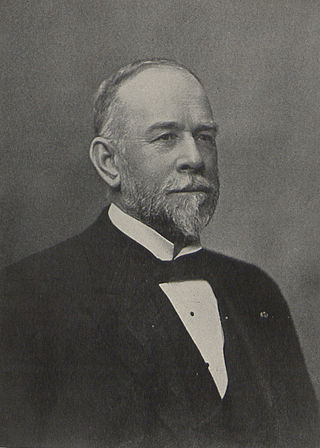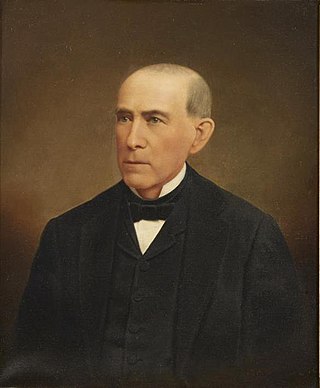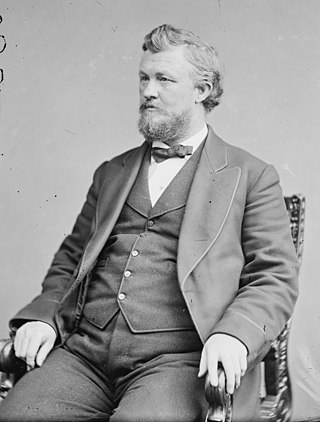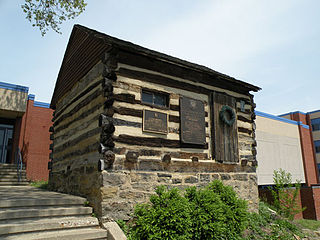Related Research Articles

James Addams Beaver was an American attorney,recruiter and field commander of Pennsylvania Infantry who was wounded four times during the American Civil War,and politician who served as the 20th governor of Pennsylvania from 1887 to 1891. He also served as the acting president of the Pennsylvania State University from 1906 to 1908.

Thomas Stanley Matthews,known as Stanley Matthews in adulthood,was an American attorney,soldier,judge and Republican senator from Ohio who became an associate justice of the United States Supreme Court,serving from May 1881 to his death in 1889. A progressive justice,he was the author of the landmark rulings Yick Wo v. Hopkins and Ex parte Crow Dog

James Campbell was a politician from Philadelphia,Pennsylvania. He served as Attorney-General of Pennsylvania and United States Postmaster General during the presidency of Franklin Pierce.

William Lawrence was a state legislator and one-term member of the United States House of Representatives from the 17th District of Ohio,serving from 1857 to 1859.

William H. Cabell was a Virginia lawyer,politician,plantation owner,and judge aligned with the Democratic-Republican party. He served as a Member of the Virginia House of Delegates,as Governor of Virginia,and as a judge on what later became the Virginia Supreme Court. Cabell adopted his middle initial in 1795—which did not stand for a name—to distinguish himself from other William Cabells,including his uncle,William Cabell Sr.

James Wilson McDill was an American lawyer,state-court judge,Republican United States Representative and Senator from Iowa,state railroad commissioner,and member of the Interstate Commerce Commission.
Earle Dukes Willey was an American lawyer and politician from Dover,in Kent County,Delaware. He was a member of the Republican Party,and served as U.S. Representative from Delaware.

Charles Ogle was an American attorney and politician who served as an Anti-Masonic and Whig member of the United States House of Representatives from Pennsylvania.

John Middleton Clayton was an American politician who served as a Republican member of the Arkansas House of Representatives for Jefferson County from 1871 to 1873 and the Arkansas State Senate for Jefferson County. In 1888,he ran for a seat in the United States House of Representatives but lost to Clifton R. Breckinridge. Clayton challenged the results and was assassinated in 1889 during the challenge to the election. He was declared the winner of the election posthumously. The identity of his assassin remains unknown.

William Mitchell was a lawyer and judge notable for his work in Minnesota as a member of the 3rd Minnesota District Court and Minnesota Supreme Court. He was also the first dean of the St. Paul College of Law,later renamed in his honor as the William Mitchell College of Law.

James Irwin Brownson,Sr.,D.D. was a clergyman and academic in Washington,Pennsylvania. He served as pastor of the First Presbyterian Church of Washington,Pennsylvania,for over 50 years.

Nathaniel Chipman was an American politician who served as a United States Senator from Vermont and Chief Justice of the Vermont Supreme Court. A Yale College graduate and Continental Army veteran of the American Revolution,Chipman became a prominent attorney and advocate for Vermont statehood. When Vermont was admitted to the Union,he served as the first judge of the United States District Court for the District of Vermont.
James Ross Snowden was an American politician from Pennsylvania who served as a Democratic member of the Pennsylvania House of Representatives representing Venango and Clarion counties from 1838 to 1843 and Venango,Jefferson and Clarion counties in 1844. He served as Speaker of the Pennsylvania House of Representatives in 1842 and again in 1844. He served as the Treasurer of Pennsylvania from 1845 to 1847,as treasurer of the United States Mint from 1847 to 1850 and as director of the United States Mint from 1853 to 1861.

The history of Washington &Jefferson College begins with three log cabin colleges established by three frontier clergymen in the 1780s:John McMillan,Thaddeus Dod,and Joseph Smith. The three men,all graduates from the College of New Jersey,came to present-day Washington County to plant churches and spread Presbyterianism to what was then the American frontier beyond the Appalachian Mountains. John McMillan,the most prominent of the three founders because of his strong personality and longevity,came to the area in 1775 and built his log cabin college in 1780 near his church in Chartiers. Thaddeus Dod,known as a keen scholar,built his log cabin college in Lower Ten Mile in 1781. Joseph Smith taught classical studies in his college,called "The Study" at Buffalo.

The First Presbyterian Church 1793,alternatively known as the First Presbyterian Church,is a Presbyterian church in Washington,Pennsylvania. It has been the de facto college church for Washington &Jefferson College since the early 19th century. It is under the Washington Presbytery.

The relationship between the City of Washington,Pennsylvania,and Washington &Jefferson College spans over two centuries,dating to the founding of both the city and the college in the 1780s. The relationship between the town and college were strong enough that the citizens of Washington offered the college a $50,000 donation in 1869 in a successful attempt to lure the Washington &Jefferson College trustees to select Washington over nearby Canonsburg as the consolidated location of the college. The relationship was strained through the latter half of the 20th century,however,as the college pursued an expansion policy that clashed with the residential neighborhood. The college's frustrations grew after preservationists unsuccessfully attempted to pass laws prohibiting the college from demolishing certain buildings that were listed on the East Washington Historic District. Relations were so bad that residents and college officials engaged in a shouting match at a meeting. Local preservationists also unsuccessfully tried to block the demolition of Hays Hall,which had been condemned.

The Brownson House is a non-profit charitable organization in providing recreation,education,and character development services in Washington,Pennsylvania. The organization's primary facility provides athletic venues for flag football,basketball,boxing,cheerleading,dance classes,indoor soccer,inline hockey,lacrosse,and volleyball. It is affiliated with the local chapter of the United Way.

John Wesley Ross was an American attorney who served as postmaster of Washington,D.C.,as president of the D.C. Public Schools Board of Trustees,and as a member and president of the D.C. Board of Commissioners.
Edward Turner was a state legislator and public official who served as Justice of the Supreme Court of Mississippi from 1824 to 1832,and again from 1840 to 1843.
References
- 1 2 3 "James I. Brownson, 82, Pennsylvania Jurist. Head of the Washington County Court Also a Civic Leader". The New York Times . January 2, 1939.
- 1 2 3 4 5 6 7 8 9 10 Eastman, Frank Marshall (1922). "Twenty-sevenths Judicial District". Courts and lawyers of Pennsylvania: a history, 1623-1923. Vol. 3. American Historical Society, Inc. p. 726.
- 1 2 "Brownson House 2002 - Youth Service". Washington–Greene County Chapter, Pennsylvania Sports Hall of Fame. Archived from the original on December 22, 2015. Retrieved September 10, 2012.